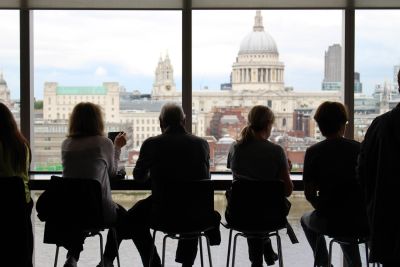Copyright Law Basics For UK Software Developers
Software developers all over the world can benefit from an increased understanding of intellectual property (IP) laws and how those laws may affect their work. Software programs are often complex works that include both functional and artistic elements and may be covered by a variety of different types of IP laws. This can be very confusing for those who haven’t been taught about IP and can cause them to miss out on opportunities to protect their own work or to accidentally infringe on the work of another.
The purpose of this article is to provide information about one type of IP law, copyright law, for software developers who live or work in the United Kingdom. Below we will discuss the definition of copyright law, the source of UK copyright law, and how it applies to technological works. I'll also elaborate on what is not covered by copyright law, as well as the UK concepts of fair dealing and moral rights as they are related to copyright law.
Copyright Law Essentials
You can learn more about copyright law in general and about how it applies to software in my previous article. Go to article →
What Is Copyright Law?
Copyright law is a type of intellectual property law that protects creative works, which can include things like plays, movies, drawings, songs, and many other things. Around the world, copyright laws give the authors or creators of literary, dramatic, musical, or artistic works the right to control the ways in which their material may be used. With regard to software, copyright law generally covers the artistic elements of a software program as opposed to the functional elements.
What Is The Source Of Copyright Law In The UK?
Copyright law originated in the United Kingdom from a concept of common law; the Statute of Anne 1709. It became statutory with the passing of the Copyright Act 1911. The current act is the Copyright, Designs and Patents Act of 1988. Those interested can read the full text here.
The relevant government office for copyright inquiries is the UK Intellectual Property Office. The UK is also a signatory to the Berne Convention, an international agreement concerning copyright law that has been adopted by 172 countries worldwide.
## How Does UK Copyright Law Apply Specifically To Technological Works?
Copyright law can apply to all kinds of technological works that are used with computers, tablets, smartphones, or video game systems. This includes apps, computer programs, databases, spreadsheets, screen displays, and even virtual reality environments. Copyright also applies to works that are used or distributed on the internet like websites, blogs, and other online content. In the UK, computer programs are specifically protected as literary works.
Throughout the European Union, the Computer Programs Directive provides guidance regarding the legal protection of computer programs. The Copyright (Computer Programs) Regulations of 1992 extended the rules covering literary works to include computer programs in other European countries as well.
What Is Not Covered By UK Copyright Law?
Copyright law in the UK, as elsewhere, does not protect ideas, procedures, methods of operations, or mathematical concepts (though other types of IP may protect them under certain circumstances). In other words, copyright law is about protecting a particular expression of an idea, not the idea itself, and not functional elements of a work. Additionally, names, titles, short phrases, and colors are not generally considered unique or substantial enough to be covered by copyright law. However, a work that combines some of the elements, such as a logo or design, could possibly be eligible for copyright (and perhaps trademark) protection.
How Long Does Copyright Protection In The UK Last?
Because the UK is a signatory to the Berne Convention which covered this issue, a copyright in the UK will typically be protected for either the life of the author plus 70 years from the death of the author or, for published works, for 70 years from the date of first publication. However, there are many exceptions to this rule, and each work should be treated on a case-by-case basis if there are any doubts.
One notable UK-specific exception has to do with the boy who never grew up, Peter Pan. Author J.M. Barrie gifted all of the rights to his creation to a children’s hospital in London. When the original copyright expired in 1987, an extension was added to the Copyright, Designs and Patents Act of 1988 mentioned above so that the hospital could continue to collect royalties based on uses of the work (though the hospital has no creative control over how the work is used). Ultimately, this is only an unusual — and perhaps endearingly British — exception to the normal copyright term.

What Is Fair Dealing?
The copyright laws of almost all countries allow exceptions for certain permitted uses of copyrighted works such as news reporting, educational uses, or where the use of the work is de minimus. In the United States, one can assert a "fair use" defense if accused of infringing a copyright if the use was due to one of these permitted activities. In the UK, these permitted activities fall under the legal concept known as "fair dealing." According to the University of Nottingham, eligible activities which can be conducted without infringing a copyrighted work include:
- Private and research study purposes;
- Performance, copies or lending for educational purposes;
- Criticism and news reporting;
- Incidental inclusion;
- Copies and lending by librarians;
- Format shifting or back up of a work you own for personal use;
- Caricature, parody or pastiche;
- Acts for the purposes of royal commissions, statutory enquiries, judicial proceedings and parliamentary purposes;
- Recording of broadcasts for the purposes of listening to or viewing at a more convenient time;
- Producing a back-up copy for personal use of a computer program.
How Does “Fair Dealing” Affect Technology Copyrights In The UK?
The "fair dealing" exceptions mentioned above may specifically impact copyrights for technology-related works such as software programs or databases. For example, producing a backup copy of a software program for personal use only would not be considered copyright infringement under a fair dealing exception. Though fair dealing explicitly excludes decompilation or copying a software program during decompilation, the European Software Directive allows software licensees to use their copy of the software "to observe study or test the functioning of the program" in order to "determine the ideas and principles which underlie any element of the program."
Therefore, users may freely observe a program as it operates to determine their functions and its underlying ideas, even if the goal is to create a competing program (see the UK case SAS Institute v. World Programming for more information on this concept). However, actual copying, for example in the case of source code copying, is not tolerated since this is explicitly protected by copyright.
For practical reasons, database copyrights would not be infringed if a person with the legal right to use part or all of a database performs steps necessary to use or access the contents of the database. Also, accessing a database for the purposes of private study or non-commercial research does not infringe copyright in a database.

Moral Rights In The UK
Another difference between the UK and other parts of the world with regard to copyright law is the UK’s emphasis on the importance of moral rights. Though this issue may not often arise in technology-related copyright disputes, moral rights are additional rights over and above the economic rights typically protected by copyright law.
In the UK, moral rights are: the right to attribution, or the right to be known or recognized as the author of a work; the right to object to derogatory treatment of a work, which includes any addition, deletion, or adaptation of a work that would distort or “mutilate” the work or injure the honor or reputation of the author; the right to object to false attribution, which basically means that you would not be named as the author of something you didn’t create; and the right to privacy of certain photographs and recordings, such as those commissioned for a private occasion.
One reason moral rights might be important for developers is that the moral right to attribution gives the developer the right to be named as the author of the software program, even though it is not common industry practice to do so. By the same token, if a developer doesn’t get their name associated with projects they didn’t work on, the right to object to false attribution protects them also. Find more information about moral rights here.
It is our hope that this information has been helpful for UK software designers and developers. Though this is only introductory information, and should not be substituted for legal counsel in the event of specific questions or disputes, education about copyright law issues and other IP issues helps to empower software designers and developers to make sure their works are fully protected.
Further Reading
- The Feature Trap: Why Feature Centricity Is Harming Your Product
- Why Content Is Such A Fundamental Part Of The Web Design Process
- An Introductory Guide To Business Insurance For Designers And Developers
- Understanding The Copyright License







